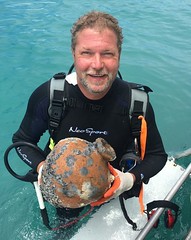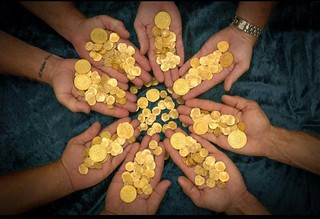
PREV ARTICLE
NEXT ARTICLE
FULL ISSUE
PREV FULL ISSUE
TREASURE HUNTING IS THE SCHMITT FAMILY BUSINESS
If your company catchphrase is "Leaving no bottom untouched", you might be a creep. Or a treasure hunter. And if you're
Eric Schmitt, it's your family business, employing your father, mother, wife and sister, and your boat is named the "Aarr
Booty". This article from Atlas Obscura profiles the Florida treasure-hunting family that made the news recently for their
big coin find. -Editor
This is not a hypothetical for Eric Schmitt, who grew up diving for treasure with his dad off the coast of Florida. “He was in the right place at the right time,” says Schmitt. The right place was Florida’s Treasure Coast, a region off the state’s Atlantic shore where a fleet of Spanish ships met their fate during a massive hurricane in 1715. Schmitt’s father, Rick, got his start during the 1960s, when the fleet was first uncovered. During those early days, divers were “bringing up a lot of treasure—tons of it”. Eleven ships sank, dragging with them caches of gold, silver, jewelry and other artifacts to the ocean floor. Modern-day treasure hunters weren’t the first to get the idea that they should plumb the sunken vessels for riches—pirates once made their way to the crash site in search of goods. Of the eleven ships, six have been uncovered. This past July marked the 300th anniversary of the initial sinking, and it was commemorated with art shows, book signings, a historical symposium and even a Pirate Festival. Schmitt and his father started working together formally in 1999, and that version of the business lasted until 2004. By then, the dramatic Florida weather had taken its toll on the Schmitts. One of the worst hurricanes in years arrived, and their boat was wrecked in the storm. Schmitt went to college and graduated but never escaped the pull of treasure hunting. They reconvened the business in 2011 and have been doing it ever since. And this isn’t just a father and son operation; Schmitt’s wife, mother and sister are all crew members. While Schmitt is underwater, his wife Lindsay is the “first mate,” keeping detailed GPS coordinates and other records. His younger sister spends her summer breaks from teaching fourth grade diving for treasure. A glance at the company’s Facebook page reveals what looks like an idyllic anti-office: Astonishingly blue water, puffy clouds, and grinning members of the Schmitt clan emerging from the water with everything from coins to shoe soles. The Schmitt’s have embraced the pirate image. Their business is called Booty Salvage and their salvage vessel is Aarr Booty. “Booty Salvage,” declares their company swag. “Leaving no bottom untouched.” The motto is accompanied by a grinning skull, tongue wagging. But that is pretty much where the pirate comparison ends. Treasure hunting is not a lark for anyone with a metal detector; Florida regulates such practices and the Schmitts have permits that allow them to excavate shipwrecks. The Schmitts are required to cooperate with archaeologists and compensate the state with up to 20 percent of their hauls, typically in objects considered historically significant. For the Schmitts, treasure hunting high season stretches from June to August. May and September are transition months, and the sea is usually too rough the rest of the year. During high season, the Schmitt’s are on the water almost every day, working mostly a 30-mile expanse where the 1715 wrecks reside, and still offer up long sunken treasure. “Thirty miles of ocean is pretty big, it can hide a lot of stuff,” says Schmitt. The Schmitt’s have found remarkable things over the years, such as a delicate gold filigree box and strands of gold necklaces, but treasure hunting is slow and steady work; not every day brings an impressive haul.
“It’s all day long, you’re out in the sun, you’re rocking on boat, you’re diving all day long with a weighted belt,” he says. “We worked hard and it’s kind of like winning the Super Bowl—you put in the same amount of work every year and it finally happens.” To read the complete article, see:
THE BOOK BAZARREWayne Homren, Editor The Numismatic Bibliomania Society is a non-profit organization promoting numismatic literature. See our web site at coinbooks.org. To submit items for publication in The E-Sylum, write to the Editor at this address: whomren@gmail.com To subscribe go to: https://my.binhost.com/lists/listinfo/esylum All Rights Reserved. NBS Home Page Contact the NBS webmaster 
|

